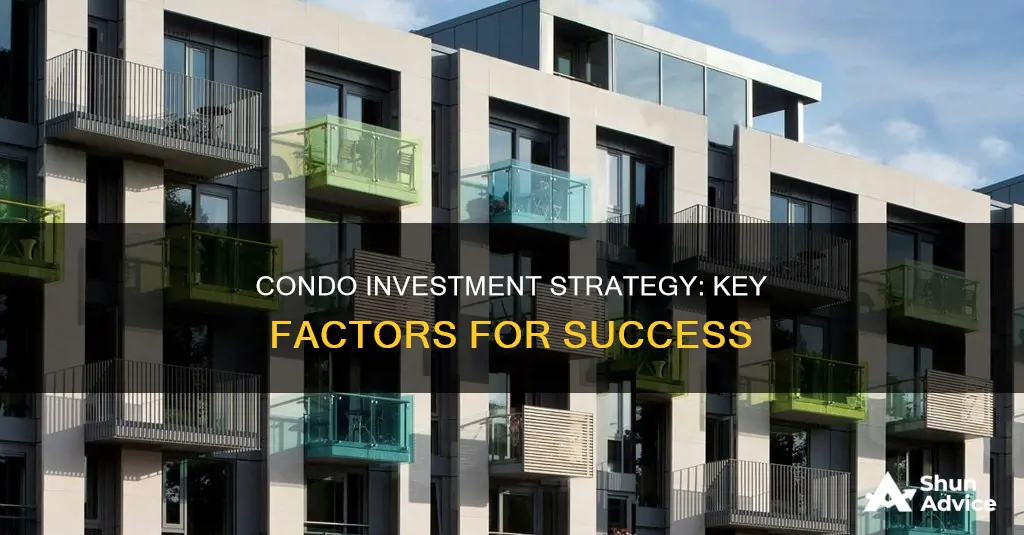
There are many things to consider when buying a condominium as an investment. Firstly, location is key. You'll want to be close to public transport, hospitals, grocery stores, parks and good schools. The quality of schools in the area can also drive up the value and market price of a condo.
It's also important to be aware of any future development plans in the area, as these could impact the view and natural light of your condo.
You should also research the condominium's board of directors, as they have a bird's-eye view of the corporation and may be able to alert you to potential problems.
When it comes to the condo itself, you'll want to consider the size, square footage and floor plan. Recent studies indicate that a good floor plan with a nice flow is top of the list for prospective buyers. You'll also want to ensure all bedrooms have windows and there is no wasted space.
It's also important to be aware of all the additional costs, including closing costs, lawyer fees, property taxes, levies, monthly utility fees, monthly condo maintenance fees and insurance.
If you're buying a new condo, you may be able to request changes, but be aware that the final result may differ from the plan. With a resale condo, you can see exactly what you're buying, but there may be fewer options when it comes to choice of unit, decorating and upgrades.
Finally, don't forget to check out the condo's amenities—while these can be desirable, they can also drive up your monthly maintenance fees.
What You'll Learn
- Location: Research future development plans, proximity to amenities, and neighbourhood demographics
- Schools: Consider the impact of school quality on value and resale
- Floor plan: Assess the layout, size, and flow of the unit
- Costs: Understand all additional costs, including closing, maintenance, and insurance fees
- Building condition: Evaluate the maintenance history and reserve fund status

Location: Research future development plans, proximity to amenities, and neighbourhood demographics
When considering the location of a condominium as an investment, it is crucial to conduct thorough research on various factors that will impact the value and potential returns of your purchase. Here are some key considerations:
Future Development Plans:
Research and understand any future development plans for the area. This includes rezoning, upcoming construction projects, and infrastructure improvements. Such developments can significantly impact the value and desirability of your condominium. For example, an upcoming transportation project that improves accessibility to the area can drive up property values. On the other hand, a planned construction project that will cause prolonged noise and disruption might be a deterrent for potential tenants or buyers.
Proximity to Amenities:
Analyse the proximity and accessibility of various amenities and conveniences from the condominium. Close access to essential amenities like supermarkets, pharmacies, and banks can be a significant draw for tenants or buyers. Additionally, consider the availability of entertainment and recreational options nearby, such as restaurants, cafes, parks, and cultural attractions. These amenities enhance the desirability of the location and can positively impact the value of your investment.
Demographics and Neighbourhood Characteristics:
Study the demographics of the neighbourhood to understand the type of tenants or buyers your condominium will attract. Consider factors such as the average age, income level, and occupation of the surrounding residents. For instance, a neighbourhood predominantly comprised of young professionals may have different needs and preferences compared to an area with a high concentration of families. Additionally, research any specific characteristics or attractions that define the neighbourhood, such as a vibrant art scene or a strong sense of community, as these can be selling points for your investment.
By thoroughly researching future development plans, considering the proximity to various amenities, and understanding the neighbourhood demographics, you can make a more informed decision about the location of your condominium investment, ultimately improving your potential for long-term success and profitability.
Federal Retirement Thrift Investment Savings Plan: Maximizing Your Retirement Benefits
You may want to see also

Schools: Consider the impact of school quality on value and resale
When investing in a condominium, it is important to consider the quality of the local schools and their potential impact on property values and resale. Research suggests that school quality is a significant factor in influencing buyers' decisions when purchasing a home. In 2017, the National Association of Realtors (NAR) found that nearly a quarter of buyers considered the quality of local schools when house hunting. This figure increased to 46% for buyers aged 30 to 39 and 36% for those aged 22 to 29.
The presence of highly-ranked schools in a neighbourhood can drive up property values. According to a 2013 study, people were willing to pay an average of $50 more per square foot for homes in top-ranked school zones compared to average districts. Similarly, a 2016 study by Realtor.com found that home values in top-rated school districts were 49% higher than the national median home price.
The positive impact of school quality on property values can be attributed to increased buyer demand. Families with children are often willing to pay a premium for homes in desirable school districts to secure a good education for their children. Additionally, buyers without children may also prioritise school quality, either because they plan to start a family in the future or because they recognise the wider community benefits associated with good schools.
The link between school quality and property values is further strengthened by the impact of school spending. According to the National Bureau of Economic Research, there is a strong correlation between school expenditures and home values. Specifically, for every dollar spent on public schools in a community, home values increased by $20. This suggests that additional investments in schools not only benefit students but also contribute to higher property values for all residents, regardless of whether they have children in the local school system.
Furthermore, the quality of schools can influence the speed of property sales. Homes in top-ranking school districts often sell faster and receive more views on listing websites compared to those in lower-ranked districts.
While school quality is a crucial factor to consider, it is not the sole determinant of property values. Other factors such as safety, commute times, job opportunities, and housing inventory also play a significant role in any market.
In summary, when investing in a condominium, it is essential to evaluate the quality of local schools and their potential impact on property values and resale. The presence of highly-ranked schools can drive up property values, increase buyer demand, and expedite the selling process. However, it is important to consider other factors as well to make a well-informed investment decision.
Planning for Retirement: A Guide for 30-Somethings
You may want to see also

Floor plan: Assess the layout, size, and flow of the unit
When buying a condominium as an investment, it's crucial to carefully assess the floor plan to ensure you're making a sound decision. Here are some detailed guidelines on what to look for when evaluating the layout, size, and flow of the unit:
Layout:
The layout of a condominium unit plays a significant role in its functionality and appeal. Here are some key aspects to consider:
- Versatility: Look for a layout that offers flexibility. Consider if you can easily add or remove partitions to create more rooms or combine existing ones. Newer condominiums often feature more open and adaptable designs. In contrast, older condos may have more load-bearing walls that cannot be moved and unusual shapes that can be challenging to work with.
- Dumbbell Layouts: This type of layout uses a central area, such as a living room, to connect the bedrooms. While this can be efficient, it may lack privacy, with the front door opening directly into the living/dining area.
- Curved Rooms: Condos with curved living rooms or unusual shapes can be eye-catching, but they pose a challenge for interior design and furnishing. Most furniture is designed for square or rectangular rooms, so take this into account if you plan to make significant changes.
- Renovation Potential: If you intend to renovate, pay close attention to the type of walls in the unit. Structural walls are typically thicker and cannot be removed, while normal walls are thinner and can be more easily modified.
- Ventilation: Ensure proper ventilation, especially in the toilet and bathroom areas. Check for natural airflow from balconies or windows throughout the unit. Layouts with too many twists, turns, and corridors may result in poor ventilation and higher air conditioning costs.
- Service Yard: Consider the size and functionality of the service yard. Some buyers convert it into a balcony-type area, while others extend the kitchen or use it for additional storage. Evaluate how you plan to utilise this space and if it meets your needs.
Size:
When assessing the size of a condominium unit, it's important to differentiate between living space and non-living areas. Here's what to keep in mind:
- Square Footage: Square footage doesn't always equate to usable living space. Older condos may have large balconies, patios, or verandahs that aren't truly living spaces. Additionally, some condos have oversized air-con ledges, planter boxes, or bay windows that contribute to the overall square footage without adding usable space.
- Void Spaces: In properties with high ceilings, such as loft-style apartments, there may be strata void spaces between the floor and ceiling. While these spaces can create a sense of openness, they are often included in the saleable area, resulting in added cost.
- Dual-Key Layouts: In dual-key units, remember that some utility rooms need to be doubled, such as toilets and kitchens for each sub-unit. This can reduce the actual living space compared to the total square footage.
- Room Sizes: Evaluate the size of the bedrooms and their ability to accommodate different bed sizes. This information is crucial if you intend to rent out the unit, as it will impact the type of tenant the unit appeals to.
- Storage: Consider your storage needs and evaluate if the unit has adequate storage space, including closets, cabinets, and designated storage areas.
Flow:
The flow of a condominium unit refers to how well the space works for your needs and how easily you can move between different areas. Here are some factors to consider:
- Separation of Spaces: Assess how well the unit separates private and public areas. For example, if you plan to host guests regularly, ensure there is enough separation between the bedrooms and living areas.
- Entryway: Evaluate the entryway and how it connects to the rest of the unit. Some dumbbell layouts may have the front door opening directly into the living area, which may be a concern for those who value privacy.
- Furniture Placement: Consider how your furniture will fit into the space. Assess if the doors can swing open without obstruction and if the layout accommodates your desired furniture arrangement.
- Natural Light: Pay attention to the direction of natural light and how it affects the unit throughout the day. Consider the placement of windows and how they impact the lighting and temperature of the space.
- Noise and Smells: Be mindful of potential noise and smell issues. For example, garbage disposal chutes located too close to the unit may result in unpleasant odours and sounds.
In summary, when assessing the layout, size, and flow of a condominium unit, carefully evaluate the functionality, versatility, and potential of the space. Consider your specific needs and how the unit can be adapted to suit your lifestyle or that of potential tenants. By thoroughly reviewing the floor plan, you can make a more informed investment decision.
Investment Bankers: Why All the Hate?
You may want to see also

Costs: Understand all additional costs, including closing, maintenance, and insurance fees
When buying a condominium as an investment, it is crucial to understand all the additional costs involved. These costs can include closing costs, maintenance fees, insurance fees, and more.
Closing costs are the expenses incurred during the purchase process, such as lawyer fees and property taxes. These costs can vary depending on the location and specific property, so it is essential to get a clear understanding from a financial advisor or mortgage advisor.
Maintenance fees are a significant ongoing cost of owning a condominium. These fees are typically paid monthly and cover the upkeep of common areas within the complex, such as lobbies, elevators, pools, and grounds. They also contribute to a reserve fund for large-scale maintenance and repairs, such as roof replacements. The amount of these fees can vary greatly depending on the amenities offered and the size of the complex. It is important to review the bylaws and financial records of the condominium association to understand these fees and how they have increased over time.
Insurance is another cost to consider when buying a condominium. While the condominium association will have insurance, you may need additional coverage for your unit. It is important to carefully read all the documentation and understand what risks and costs are covered by the association's insurance and what additional coverage you may need.
Other costs to be aware of include monthly utility fees, which typically cover water, gas, and electricity. In some older condominiums, these fees may be included in the monthly maintenance fees. There may also be an occupancy fee, which covers the period between taking occupancy and actually moving into the unit.
When purchasing a condominium as an investment, it is crucial to understand all the additional costs involved. These costs can impact your long-term budget and the potential return on your investment. By reviewing the association's financials and bylaws, and seeking advice from financial professionals, you can make an informed decision about your condominium purchase.
The Great Debate: Mortgage Freedom or Investment Opportunities?
You may want to see also

Building condition: Evaluate the maintenance history and reserve fund status
When buying a condominium as an investment, it is crucial to evaluate the building's maintenance history and reserve fund status. This due diligence will help you avoid costly surprises and ensure a more informed decision. Here are some essential considerations:
Maintenance History:
- Research the maintenance history of the building. Find out if there have been any significant repairs or renovations and how well the condominium corporation has maintained the property. Inquire about the frequency and type of maintenance conducted.
- Understand the age of the building and its impact on maintenance needs. Older buildings may require more frequent repairs and upgrades, which could result in higher maintenance fees or special assessments.
- Review the minutes of board and member meetings to gain insights into the building's maintenance practices and any ongoing or anticipated issues.
Reserve Fund Status:
- Assess the financial health of the condominium corporation by reviewing its reserve fund. This fund covers the costs of significant repairs and replacements of common elements, such as the roof, plumbing, or elevators.
- Analyze the corporation's annual operating budget and financial statements to determine if the reserve fund is adequately funded. Look for any signs of underfunding, as it could lead to sudden fee hikes or special assessments.
- Understand the proportion of your condo fees that go towards the reserve fund. Ensure that the fund is sufficient to cover future major repairs and replacements.
- Inquire about any pending lawsuits or litigation history involving the condominium corporation. This information can be obtained through public records or by consulting a real estate lawyer.
By thoroughly evaluating the maintenance history and reserve fund status of the condominium, you can make a more informed investment decision and avoid potential financial pitfalls.
Inflation-Proof Retirement: Navigating Investments in Uncertain Times
You may want to see also
Frequently asked questions
Condominiums are typically cheaper than single-family homes and have lower maintenance requirements, making them a good option for those on a budget or looking to downsize. However, there may be strict rules and regulations to follow, and lenders may scrutinise loans more carefully.
It is important to research any future development plans for the area, as well as the demographics. The value and market price of a condo are often driven up by the quality of schools in the area, so this is an important factor to consider. Other things to look out for include proximity to public transport, hospitals, grocery stores, parks and good schools.
Before buying a condo, it is important to request and read all the rules and documents that apply to the management of the complex. You should also research the homeowners association (HOA) and review the bylaws to determine what is covered by the HOA. It is also a good idea to talk to neighbours to see if they are happy with how the condo is managed.
In addition to the purchase price, there are several other costs to consider when buying a condo. These include closing costs, lawyer fees, property taxes, levies, monthly utility fees, monthly condo maintenance fees and insurance. There may also be occupancy fees (or "phantom rent") to cover the period between taking occupancy of the unit and officially moving in.
It is important to consider the size and floor plan of the condo to ensure it accommodates your needs and budget. Recent studies indicate that a floor plan with good flow was top of the list for prospective buyers. Other things to look out for include ensuring all bedrooms have windows and that there is no wasted space, such as an extra-wide or long hallway.







